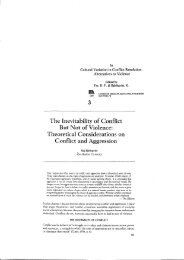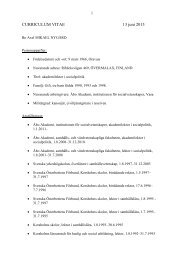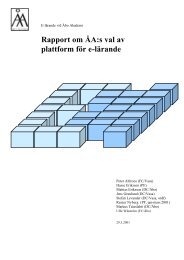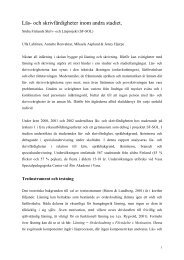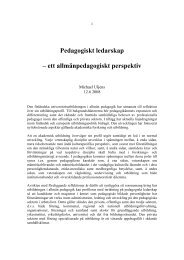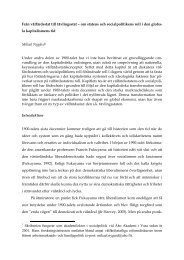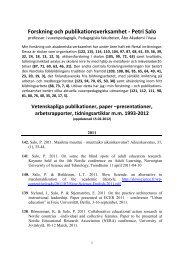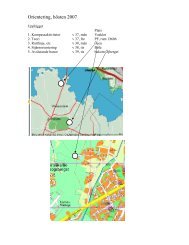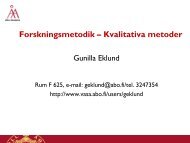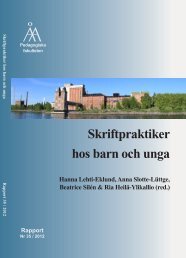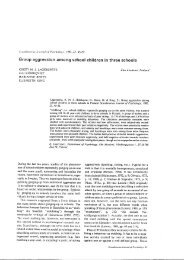Parties, Candidates and Citizens On-Line - Åbo Akademi
Parties, Candidates and Citizens On-Line - Åbo Akademi
Parties, Candidates and Citizens On-Line - Åbo Akademi
Create successful ePaper yourself
Turn your PDF publications into a flip-book with our unique Google optimized e-Paper software.
“Not only does this form of participation have greater educative effects for<br />
the individual, it also strengthens the social <strong>and</strong> personal links without which<br />
democracy becomes simply a set of purely formal procedures. In turn social<br />
ties strengthen a willingness to compromise <strong>and</strong> strengthen the ability to offer<br />
alternatives on policies […] In short, face-to-face contact produces `rich talk´<br />
rather than formal debate, which is a highly desirable outcome. […] Surely,<br />
though, popular debate <strong>and</strong> discussion, however conducted, have certain<br />
characteristics in common which make them recognizably the same. […] Both<br />
electronic <strong>and</strong> face-to-face debates can be regarded therefore as variants of<br />
direct democracy…” (Budge, 1996: 29-30)<br />
As a counterweight to the optimistic mobilization theory, an essentially opposite point of<br />
view regarding internet politics has emerged. This cautious, sometimes even pessimistic,<br />
approach is called the reinforcement theory. The basic argument inherent in the<br />
reinforcement theory is that the revival of political participation through the web, argued<br />
by the proponents of the mobilization theory, is highly questionable (Davis, 1999: 2;<br />
Norris, 1999b: 72-73; Norris, 2001b: 217- 219). Politics on the internet will more likely<br />
only attract the politically ‘converted’ citizens (e.g. Norris, 2001d).<br />
Generally, there are many reasons to be cautious when considering the<br />
implications of a possible shift into electronic politics. Pessimistically, Bimber (2000: 332)<br />
writes that the increasing flow of information <strong>and</strong> political outlets provided by the web,<br />
are in no way guaranteed to save democracy. <strong>On</strong> the contrary, it is very plausible that<br />
citizens’ participation is further fragmented into small communities with little in common<br />
(c.f. Barber, 1998). Dahl (1989: 520) also calls for caution regarding the electronic<br />
discussion boards. Concerning these, he states, there are no guarantees that electronic<br />
participation increases citizens’ political knowledge. Moreover, he points out that the new<br />
technology might even be abused by those in power, <strong>and</strong> thus works in contradiction to<br />
the ideal of direct democracy. In addition, Budge mentions that there still remains much<br />
uncertainty concerning the quality of electronic debates, an uncertainty which makes<br />
direct comparisons with physical conversations impossible. Str<strong>and</strong>berg (2003) found<br />
indications of poor discussion quality in electronic debates; on some discussion boards<br />
the debates are negative in tone, if not even antagonistic (c.f. Bentivegna, 1998; Löfgren,<br />
2001). Thus, one can question the discussion boards’ ability to create “strong democratic<br />
conversations” as Barber (1984) hopes for.<br />
Concerning the citizens’ on-line activity, further objections to the visions of the<br />
mobilization theory can be put forth. Regarding this, proponents of the reinforcement<br />
theory have pointed at two causes for the internet’s failure to mobilize the masses. Firstly,<br />
the technological resources required for internet usage are unevenly divided. Globally<br />
there exists a divide in internet penetration between the rich industrialized nations of the<br />
northern hemisphere <strong>and</strong> the poor developing countries of the southern hemisphere<br />
148



